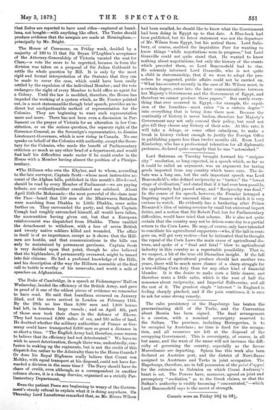Even the patient Peers are beginning to weary of the
Govern- /limb's steady refusal to explain what it is doing anywhere. On Intinraday Lord Lansdowne remarked that, as Mr. Rivers Wilson had been recalled, he should like to know what the Government had been doing in Egypt up to that date. A Blue-book had been published, but its latest statement was not the departure of Mr. Wilson from Egypt, but his arrival there. Lord Salis- bury, of course, snubbed the inquisitive Peer for wanting to know things " while negotiations were in progress," but Lord Granville could not quite stand that. He wanted to know nothing about negotiations, but only the history of the events which preceded them, so Lord Beaconsfield had to rise. He solemnly informed Lord Granville, who is not quite a child in statesmanship, that if we were to adopt the pro- cedure he suggested, public affairs could not be carried on. " What has occurred recently in the case of Mr. Wilson must, in a certain degree, enter into the later communications between her Majesty's Government and the Government of Egypt, and therefore we cannot produce these papers." But surely every- thing that ever occurred in Egypt,—for example, the expul- sion of the Israelites—must enter "in a certain degree" into everything that is being done there now. Because the continuity of history is never broken, therefore her Majesty's Government may not only conceal their policy, but need not give till they choose any history of their acts. At this rate, it will take a deluge, or some other cataclysm, to make a break in history violent enough to justify the Foreign Office in publishing papers less than twelve months old. Even Lord Kimberley, who has a professional toleration for all diplomatic pretences, declared quite savagely that he was " astonished."


































 Previous page
Previous page